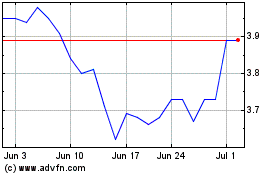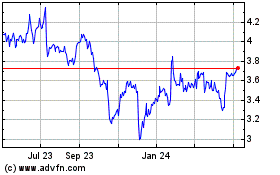Nokia Shares Slide as 5G Troubles Prompt a Profit Warning -- 2nd Update
October 24 2019 - 8:01AM
Dow Jones News
By Parmy Olson and Dominic Chopping
Nokia Corp. shares fell more than 20% after it cut profit
guidance for this year and next and halted its dividend to cover
the growing costs of rolling out equipment for 5G mobile
networks.
The telecom-equipment maker blamed shrinking profit margins on
weak performance in China, pricing competition from rivals like
Huawei Technologies Co. and Ericsson AB and an uncertain outlook
amid carrier consolidation in North America. To cope, Nokia said it
won't pay dividends in the third and fourth quarters so it can
strengthen its cash position and invest more in its 5G product line
up. The company said it expects to resume dividend payments after
its cash position improves.
"We expect that we will be able to progressively mitigate these
issues over the course of next year," Chief Executive Rajeev Suri
said.
Nokia is the world's second-largest telecom gear maker by market
share, behind Huawei. The industry is in the middle of a race to
supply the world's carriers and internet providers with equipment
to build out 5G networks. The new networks promise faster
connections and the ability to link everything -- from cars,
factories and an array of gadgets -- to the internet.
But the rollout has been fitful and hard to forecast. Nokia said
early versions of the new equipment are proving costlier than
expected to develop and manufacture. Huawei and other Chinese
makers have always competed fiercely on prices. Recently, Ericsson,
too, has cut prices in a bid to build market share.
Analysts had raised expectations that the two European giants
might benefit from a U.S. push to discourage allied governments and
their carriers from buying Huawei gear. The U.S. has said Huawei
could be compelled by Beijing to use its components and employees
to spy on or disrupt foreign networks. Huawei has said it would
never do such a thing.
Nokia, in particular, seemed well placed to benefit, with recent
inroads in both the U.S. and China, the world's two biggest
markets. The pressure on Huawei, though, has pitted Nokia and
Ericsson against each other, as they both try and pick up any of
its business. The two are competing particularly fiercely in the
U.S., where Huawei is all but banned.
Nokia said Thursday that consolidation there has made that
market tougher. In July, the U.S. Justice Department approved a $32
billion merger between Sprint Corp. and T-Mobile US Inc.
Ericsson has been pricing its products aggressively around the
world, at the expense of its own margins, to boost its market
share. Last week, it reported higher earnings and raised its sales
targets for 2020 amid what it described as a faster-than-expected
changeover to 5G among carriers, particularly in China. Still,
Ericsson Chief Executive Borje Ekholm said volumes and price levels
were hard to forecast.
China has been a disappointment for Nokia, too. Greater China
made up 8% of Nokia's net sales in the third quarter, the company
said Thursday. But revenue from the region fell by 21% from the
year-earlier period.
Finland-based Nokia also faces headwinds in its home market in
Europe. The continent has been a "slower burn" on 5G take up, said
Tim Hatt, head of research at GSMA Intelligence, which tracks the
industry.
The U.S. pressure against Huawei, meanwhile, hasn't appeared to
slow the Chinese giant down. Third-quarter revenue for the
equipment and smartphone maker rose 26.7%, to 209.5 billion yuan,
($29.6 billion) according to calculations based on numbers it
released last week and previous disclosures.
It has been especially strong in its home market. Of the 52
Chinese cities that have awarded 5G cellular-equipment contracts,
42 selected Huawei, according to a European executive familiar with
the Chinese rollout. A recent decision by two of China's three
major wireless carriers to jointly build a shared 5G network means
that Chinese carriers won't need to buy as much equipment from any
manufacturer, further hindering Nokia's prospects for sales in the
country.
On Thursday, Nokia reported net profit of EUR82 million ($91
million), up from a loss of EUR79 million in the year-ago quarter.
Sales for the period rose a higher-than-expected 4.2%, to EUR5.69
billion.
But a steep erosion in profit margins weighed on the higher
revenue. Margins for its network equipment fell to 29.1% from
34.1%, Nokia said.
The company also cut its full-year guidance, and is now
expecting 2019 adjusted earnings per share of 21 euro cents, plus
or minus 3 cents, down from an earlier range of between 25 and 29
cents. For 2020, it now expects adjusted EPS of 25 cents plus or
minus 5 cents, from an earlier range of between 37 and 42
cents.
Sales for the quarter rose 4.2% to EUR5.69 billion, with
analysts having expected EUR5.62 billion.
--Stu Woo in Beijing contributed to this article.
Write to Parmy Olson at parmy.olson@wsj.com and Dominic Chopping
at dominic.chopping@wsj.com
(END) Dow Jones Newswires
October 24, 2019 07:46 ET (11:46 GMT)
Copyright (c) 2019 Dow Jones & Company, Inc.
Nokia (NYSE:NOK)
Historical Stock Chart
From Mar 2024 to Apr 2024

Nokia (NYSE:NOK)
Historical Stock Chart
From Apr 2023 to Apr 2024
